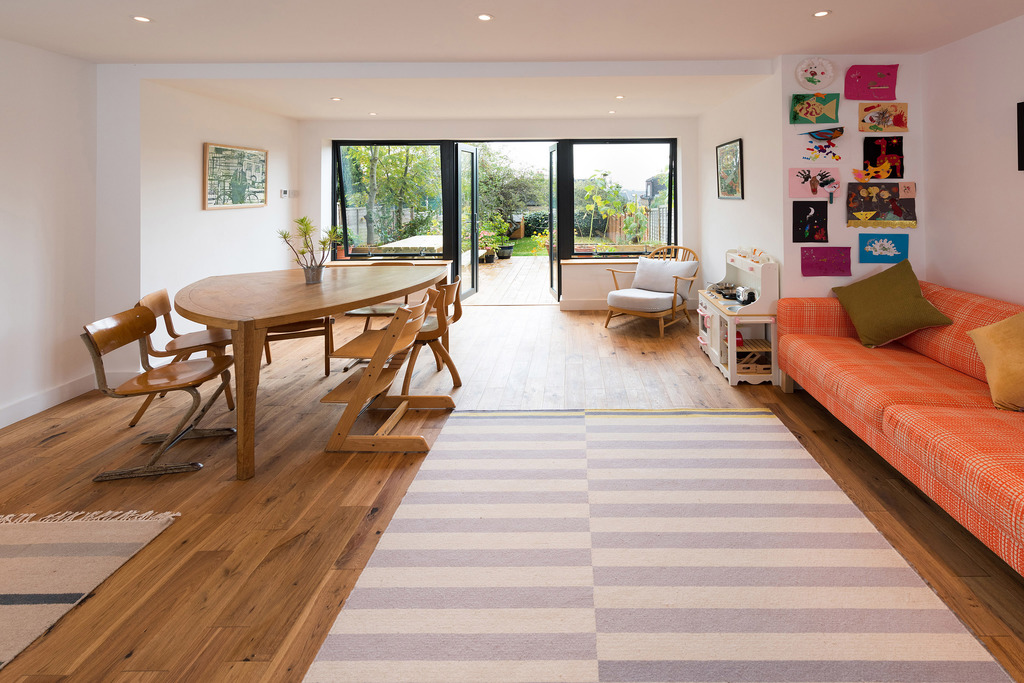Expert Advice - Basement Conversions
Share
Copy Link
With the rising cost of moving home, many people are now looking to either extend into the loft, to the rear or add a basement conversion. A basement conversion is a great way to add an extra room and can be used for anything from a kitchen/lounge to a study or playroom. We catch up with London based Basement Masters to find out some more.
Love Renovate (LR): How long does a basement conversion take?
Basement Masters (BM): Generally, a minimum 6-9 months depending on size and other issues. This includes both the planning and construction process.
LR: Do I need to apply for planning permission and are there any other applications/regulations that i need to take into account?
BM: In most instances where a habitable living area is to be created, planning permission should be sought. However, in some circumstances, where a cellar already exists and the work will not alter the façade of the property, planning permission may not be required. If in doubt, we will seek confirmation from the planners on your behalf.
Regardless of whether you need to apply for planning permission, you will need to comply with building regulations. If the conversion impacts a Party Wall, you must also seek approval under the Party Wall etc. Act 1996.
LR: What is the approximate cost range for a conversion (per metre squared)?
BM: Generally the typical basement conversion costs from £2,500 per metre squared upwards depending on what is being done. No two basements are exactly the same, we therefore carry out an initial survey to give you a budget cost before we begin the work.
LR: Do I need to have an existing cellar to create a basement extension?
BM: In basement construction there is no need for there to be any existing basement. You can create your basement conversion from either an existing cellar or creating an entirely new basement under an existing home.

Basement conversion by Basement Masters
LR: What are the main steps in a basement conversion?
BM: The process is as follows:
Initial Process:
- To establish feasibility and possibly an indicative budget cost.
- Appointment - At your proposed site.
- Quotation/Contract Offer – sent within 7-10 working days.
- Offer Acceptance – a full comprehensive survey carried out, full set of planning approval drawings.
- Plans Submitted – The Local Authority should make their decision within 8 weeks however, this could take longer.
- Exploratory Tests & Trials – The information complied is used in the structural design.
- Preparation of Full Set of Building Regulation Drawings – along with structural details, specifications and calculations.
- Appoint Party Wall Surveyor – this time could vary immensely. If required details and package are fully prepared this could speed up the process
- Set Start Date – once all preliminary and legal work is complete.
- Pre-commencement Meeting – this is fundamental to the success of the whole project.
- Commencement on Site – We secure the site and make it safe before any construction work is carried out.
Construction Process:
Week 1
- Erect independent hording and access area
- Provide temporary weather-proofing and supports
- Supply external washroom facilities
- Supply temporary electrics
Week 2-8
- Commence excavation and underpinning
- Install any below slab concrete padstones
Week 9-11
- Excavate the bulk of soil and dispose of accordingly
Week 12-13
- Cut into existing brickwork
- Prepare to receive structural steel bearing spreader plates/ concrete padstone
- Install heavy duty steel beams and universal beams
Week 14
- Create new reinforced basement floor slab incorporating sump and drainage systems
Week 15-16
- Supply and fix a cavity drain waterproofing system
Week 17-22
- Construction and formation of external light wells
- Install Cat ladder in lightwell
- Metal stud dry line around external wall perimeter
- Cavity to be filled with quilted installation
- Internal partitions to be formed
- New suspended ceiling to be constructed
- All first and second fix electrics and plumbing
Week 23-27
- Seal existing doorways
- Install new stairwell
- Close tread softwood string staircase
- Complete all second fixing (including electrics, plumbing, skirting, doors and architraves)
Week 28
- Arrange Building Control Final Inspection to approve works
- Clear site and handover job
Completion Process:
Inspection – Final inspection carried out.
- Certificates Issued – Membrane, Structural Waterproofing, Electrical and Gas Certificates.
- Servicing – Basement Pump Service

Basement conversion by Basement Masters
LR: What’s the minimum height you recommend?
BM: We would recommend a minimum height of 2.4m
LR: How do you protect against dampness in a basement conversion?
BM: The use of cavity drain membrane lined to the walls and floors, incorporated with pumping systems and other tanking methods. Cavity membranes are considered to be the most reliable way to waterproof a basement and will protect effectively against any damp issues.
LR: What’s the best way to ensure the basement conversion gets enough light?
BM: Ways to incorporate good natural light in your basement planning include:
- Incorporating multiple lightwells, especially on southern elevations
- Consider a sunken courtyard garden, with glass doors accessing it
- Design a large open plan stairwell through the entire building, lit from above by a large roof light
- Glass balustrading and open tread staircases allow borrowed light from the hallway above to permeate down
- An open plan layout allows daylight to reach throughout the basement
- Glass partition walls, glazed or partially glazed doors, and glazed top lights above doors allow light to permeate between spaces
- Where a basement extends beneath the garden, flat rooflights are a great way to bring in light
- Investment in a good lighting scheme is essential
- The use of neutral colours and natural finishes to enhance light and space

Basement conversion by Basement Masters
LR: What are the biggest challenges involved in a basement conversion?
BM: Party wall issues & negative press leading to misguided public conception.
LR: Is there anything else I need to know before I start planning?
BM: Research with the local authority on whether you require planning permission and other potential obstacles. Make sure you have a clear budget and understand all of your costs before you begin.
Published: May 14, 2020



